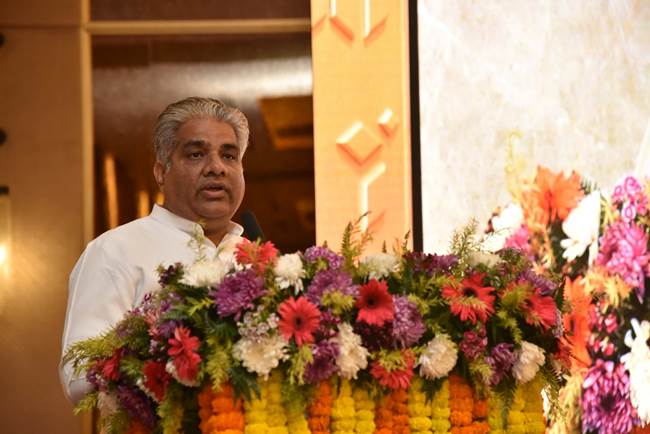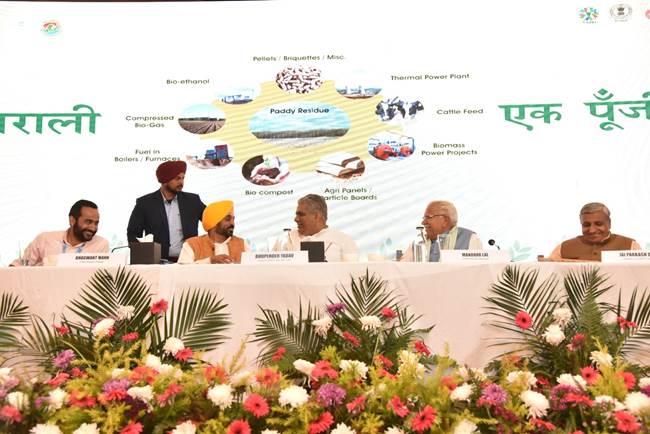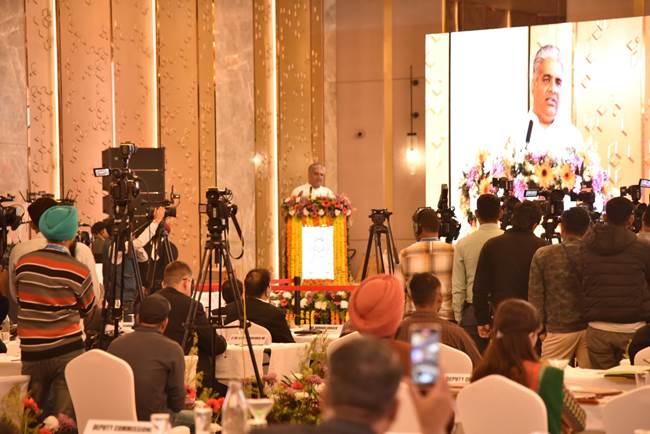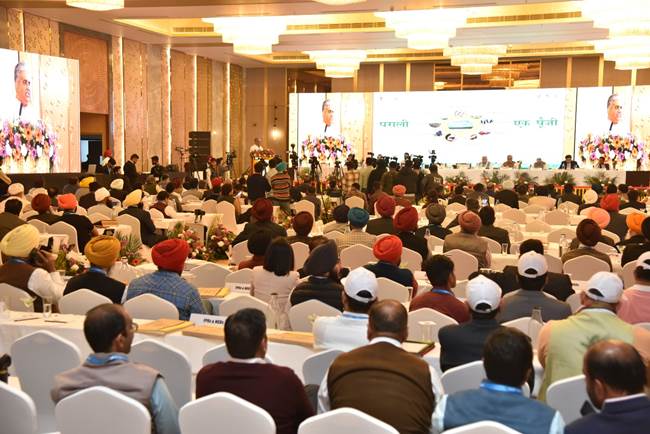
Moving with an aim for a substantial reduction in the incidences of paddy stubble burning incidences during 2023 and to maximize management/ utilization of paddy stubble, the Commission for Air Quality Management in NCR & Adjoining Areas (CAQM) under the guidance of Ministry of Environment, Forest & Climate Change (MoEF&CC) and in association with Governments of Punjab and Haryana organized its workshop “पराली – एक पूँजी” at Chandigarh today.

The Special Session of the workshop was chaired by Union Minister for Environment, Forest and Climate Change, Shri Bhupender Yadav in the presence of Chief Ministers of Punjab and Haryana, and Agriculture Minister of Haryana and Environment Ministers of Punjab. The interactive workshop focused on bringing together all strata of stakeholders viz. Governments, Institutions, NGOs, Social and Religious Groups, FPOs, Entrepreneurs, Industry representatives, etc. on a common platform to discuss upon strategies/ techniques for sustainable and efficient management and utilization of paddy stubble.

Speaking on the occasion, Union Minister of Environment, Forest & Climate Change, Shri Bhupender Yadav commended the concerted and collaborative efforts of the Commission and State Governments of Haryana and Punjab and all other stakeholders to substantially bring down the paddy farm fire counts during 2022 and urged all to work in the direction of total elimination of the unsustainable agricultural practice. Further, Shri Yadav also declared a financial assistance model through Central Pollution Control Board (CPCB) for capital subsidy for setting up of pelleting/ briquetting plants for different ex-situ projects.

While inviting suggestions and inputs from the audience in an open interactive session, Shri Yadav said, “The Government is committed to work for the welfare of the farmers and will continue to do so in future.”
Further, Chief Minister of Haryana, Shri Manohar Lal said, “Burning paddy stubble won’t create employment/ income, but its effective management can. Agricultural Waste (पराली) of today will be an asset (पूँजी) of tomorrow.”
In furtherance, Chief Minister of Punjab said, “Farmers should be aware of the fact that the stubble that is generated in their fields is a source of wealth for them and not a liability.”
Addressed Parali-Ek Punji, a workshop on the problem of stubble burning, in the presence of Haryana CM Shri @mlkhattar and Punjab CM Shri Bhagwant Mann.
Stated that under PM Shri @narendramodi ji, India is on way to make stubble an example of our waste to wealth journey. pic.twitter.com/dayuihYxJO
— Bhupender Yadav (@byadavbjp) February 20, 2023
Constructive discussions along with resourceful insights were a highlight of the interactive workshop. The 1st Technical Session of the workshop involved discussions on different thoughtful topics: Way forward for reduction of paddy straw, diversification to other crops/ varieties, promotion of DSR method, etc.; Improving efficacy of PUSA Bio-decomposer; Effective In-situ management through optimal utilization of CRM machinery and IEC activities/ campaigns towards prevention of stubble burning.
2nd Technical Session mainly focused on Ex-situ utilization of paddy straw and deriving economic value for farmers and other players in the value chain. The session saw presentations on: Perspective on Ex-situ management of agricultural residue in Punjab and Haryana; Production of Bio-ethanol from paddy straw and Biomass; Manufacture of CBG from Paddy Straw; Biomass based Power Projects using Paddy Straw; Paddy Straw as fuel in Industrial Boilers; 100% Fueling of brick kilns by Biomass/ Paddy Pellets; Manufacture of pellets/ torrefied pellets for fuel in Thermal Power Plants and brick kilns and other industrial applications; Potential of paddy straw in applications like particle board industry, packaging, etc.

Towards abatement of air pollution in the National Capital Region and adjoining areas on account of sporadic and unsustainable large scale paddy stubble burning incidents, continual efforts in this direction though have started to yield results, a lot is yet to be desired to comprehensively address this issue, towards environmentally sustainable disposal of paddy straw and abatement of air pollution in the region.
The Commission has so far issued various directions and advisories, besides executive orders to various agencies concerned in the NCR including State Governments, GNCTD, State Government of Punjab and various bodies of the Central and State Governments in the region, laying down responsibilities and concrete steps to abate pollution and ameliorate air quality in the region.
Whether it is about vehicular pollution, industrial emissions, stubble burning, roadside dust generation, solid waste management, use of DG sets, etc. the Commission is taking up every issue with utmost concern and it has pulled out all the stops to issue necessary Directions and Advisories to tackle it effectively.
*****
MJPS/SSV



